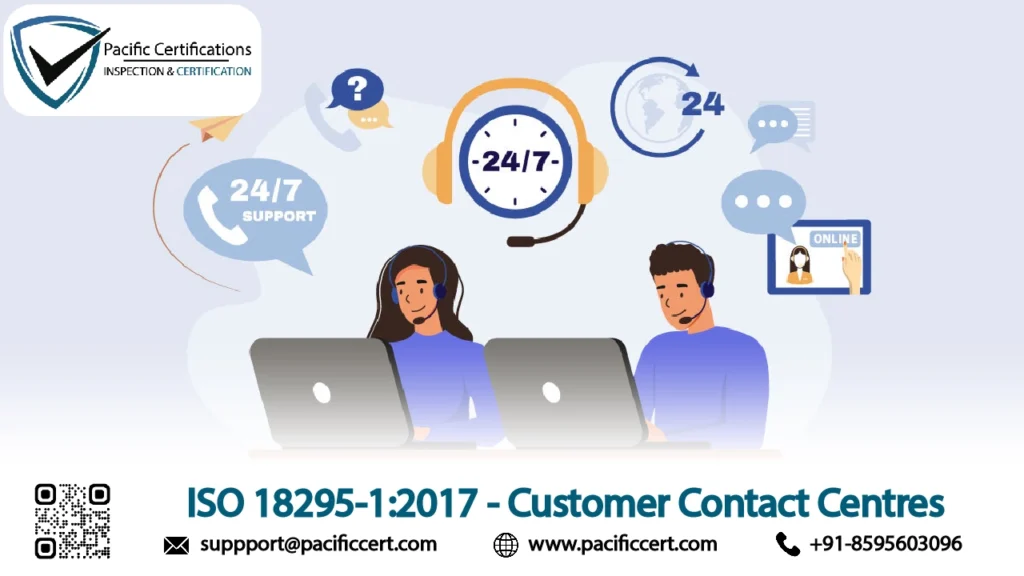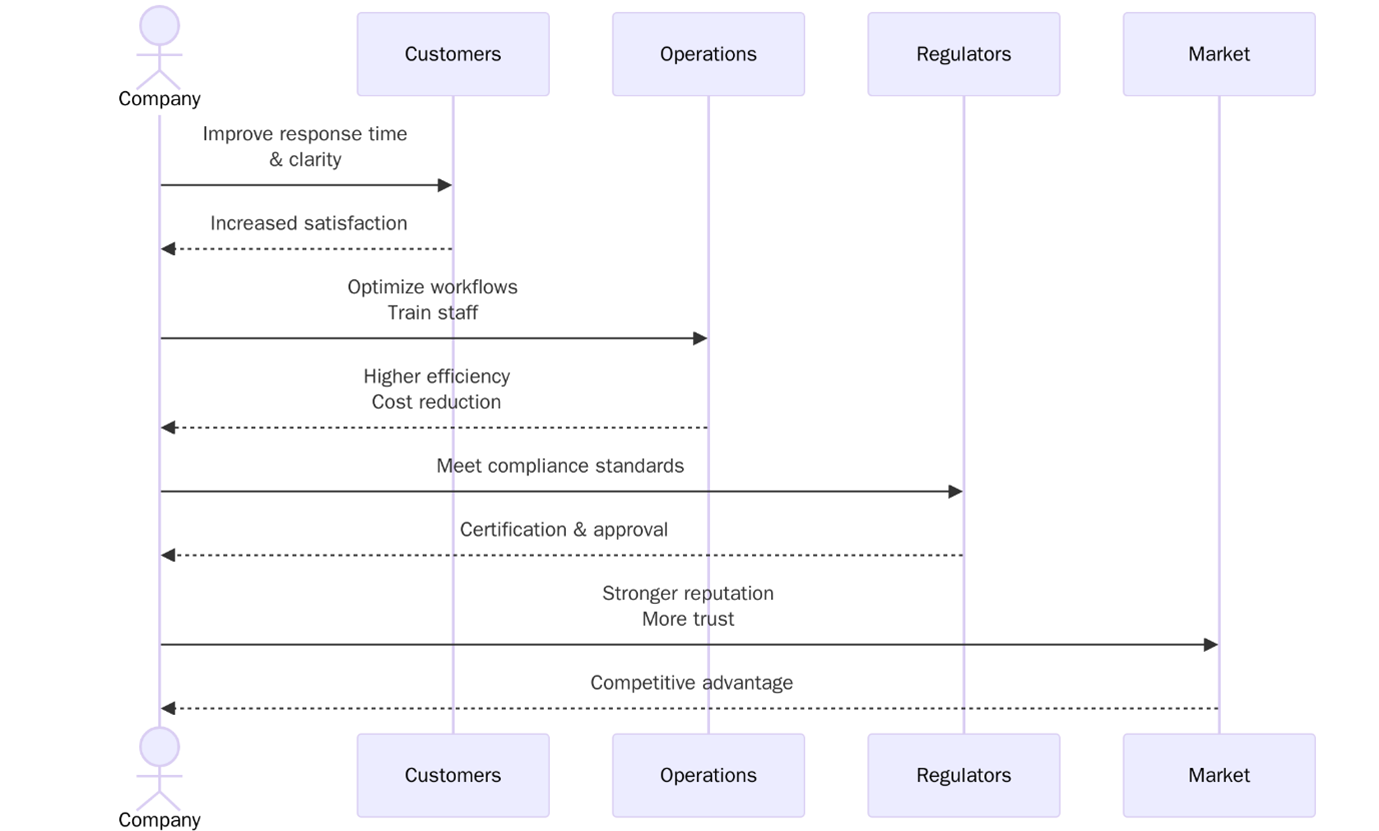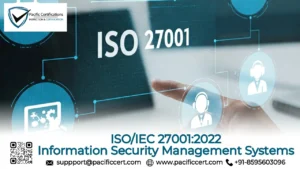ISO 18295 – Customer Contact Centres – Requirements for Customer Contact Centres

ISO 18295-1:2017 provides a comprehensive framework for enhancing the performance and consistency of customer contact centres (CCCs), ensuring that interactions between service providers and customers meet high standards of quality, efficiency, and satisfaction. Applicable to both in-house and outsourced centres, this standard promotes transparency, responsiveness, and professionalism across all communication channels, including voice, chat, email, and social media.

It is part of a broader standard series that includes ISO 18295-2, which focuses on requirements for client organizations using CCC services, making the pair a complete guideline for managing and outsourcing contact centre operations.
What is ISO 18295-1 Certification?
ISO 18295-2 is specifically targeted at organizations that outsource CCC operations. It provides a structured framework to help clients define, manage, and monitor service expectations in contracts and through service-level agreements (SLAs). It ensures that quality, regulatory compliance, and customer experience remain controlled even when service delivery is externalized.
To get started with ISO 18295-1 certification, contact support@pacificcert.com.
Scope and Applicability
This standard applies to any organization operating a customer contact centre or managing customer interactions through a centralized team, regardless of size, industry, or service model. It is particularly relevant to businesses operating in telecom, banking, insurance, e-commerce, public utilities, and healthcare sectors, where quality of customer engagement is critical.
ISO 18295-1 is also designed to be compatible with multi-channel and omnichannel environments. It addresses customer expectations, agent qualifications, service infrastructure, feedback mechanisms, and ongoing performance monitoring, aiming to align customer experience with the strategic objectives of the organization.
For more details on how ISO 18295-1 applies to your organization, contact support@pacificcert.com.
ISO 18295-1 Certification Process
- Conduct a readiness assessment to evaluate current contact centre practices against ISO 18295-1 requirements.
- Identify areas for improvement and establish a structured implementation plan that includes quality objectives, communication standards, and performance indicators.
- Provide staff training on ISO-aligned service protocols, complaint handling procedures, data privacy expectations, and customer engagement strategies.
- Implement standardized practices across all service channels to ensure consistent quality of service and compliance.
- Perform internal audits and management reviews to assess the effectiveness of implementation and identify any remaining gaps.
- Schedule and complete an external certification audit with a certification body such as Pacific Certifications.
- Address any findings or recommendations from the audit and finalize certification documentation.
- Upon successful completion of the audit, receive official ISO 18295-1 certification.
Start your certification process today by emailing support@pacificcert.com.
Documentation Required
Organizations must maintain comprehensive records and documentation that demonstrate alignment with ISO 18295-1 requirements. These documents serve as evidence of consistent service delivery, quality monitoring, and customer-focused performance. Key documentation includes:
- Standard Operating Procedures (SOPs) for all customer interaction workflows
- Training records and competency evaluation reports for agents and staff
- Customer interaction logs and call/chat/email records
- Feedback collection tools and analysis reports
- Complaint handling protocols and resolution logs
- Data privacy and information security control procedures
- Service Level Agreements (SLAs) and performance commitments
- Regular service performance reports with KPIs and trend insights
For help developing ISO-compliant documentation, reach out to support@pacificcert.com.
Eligibility Criteria
Organizations eligible for ISO 18295-1 certification include any that manage direct interactions with customers, whether through internal teams or external service providers. To be considered, a CCC must operate a structured system for managing calls or digital interactions and have defined responsibilities and oversight mechanisms.
ISO 18295-1 Certification Costs
Certification costs depend on the scale of operations and the complexity of the services provided. Smaller centers with fewer than 20 employees spend below $3000, while medium to large centres with 20 to 100+ agents may incur costs ranging from over $10,000, particularly if multisite operations or integrations with other standards (like ISO 9001) are involved.
Request a detailed quotation from support@pacificcert.com.
ISO 18295-1 Certification Timeline
The implementation and certification process spans approximately 2.5 to 4 months. This includes an initial gap analysis, planning and staff training, procedural implementation, documentation, internal audits, and the final certification audit. Organizations that already follow structured service processes may complete the cycle more quickly.
Contact support@pacificcert.com to create a tailored implementation timeline.
ISO 18295-1 Requirements
Organizations seeking ISO 18295-1 certification must:

- Define customer-oriented service policies that promote satisfaction and transparency
- Ensure staff competence through formal training, evaluation, and defined skill matrices
- Maintain clear and consistent communication with customers across all interaction channels
- Establish and implement effective complaint handling and resolution procedures
- Protect customer information through robust data privacy and security measures
- Monitor operational performance using KPIs such as resolution time, customer satisfaction, and interaction quality
- Maintain infrastructure and support systems to ensure reliability and continuity of service
Need help understanding these requirements? Contact support@pacificcert.com.
ISO 18295-1 Certification Benefits
Adopting ISO 18295-1 delivers a range of measurable benefits, including:

- Enhanced customer experience through structured and standardized interactions
- Increased employee engagement and morale due to clearer roles and expectations
- Improved service delivery quality and efficiency through continuous monitoring and feedback
- Strengthened brand reputation by demonstrating commitment to service excellence
- Greater competitive edge in service-driven industries
- Easier integration with ISO 9001 (quality) and ISO/IEC 27001 (data security) systems
Customer service is evolving with the rise of automation, artificial intelligence, and customer expectations for personalized, rapid service. ISO 18295-1 provides a flexible but structured foundation to meet these demands by emphasizing human interaction quality, process transparency, and system responsiveness.
In outsourced environments, ISO 18295-2 helps ensure that service expectations set by clients are met consistently by providers. As regulatory bodies and customers demand higher transparency and data security, adherence to standards like ISO 18295 becomes a key differentiator.
Organizations integrating ISO 18295-1 with ISO 9001 (quality management) and ISO/IEC 27001 (information security) gain an added advantage in aligning business performance, compliance, and customer experience under a unified management system.
How Pacific Certifications Can Help?
Pacific Certifications offers full-cycle support from initial assessments to post-certification monitoring. Our services include training, policy development, documentation templates, and third-party audits. Whether your contact centre is in-house, outsourced, or hybrid, we ensure you meet ISO 18295-1 requirements efficiently and cost-effectively.
We also support implementation of ISO 18295-2 for client organizations managing external CCCs.
Start your journey toward ISO 18295-1 certification with Pacific Certifications, support@pacificcert.com.
Frequently Asked Questions (FAQs)
Is ISO 18295-1 mandatory?
No, but it is widely recognized as a best practice standard for customer service excellence.
Does ISO 18295-1 apply to digital-only or AI-driven contact centres?
Yes, the standard applies regardless of interaction channel, including digital and automated systems.
What is ISO 18295-2 and how is it different?
ISO 18295-2 provides requirements for clients of contact centres to help them define expectations and manage service delivery from external providers.
How long does certification last?
Typically valid for three years, with annual surveillance audits to ensure continued compliance.
Can ISO 18295-1 be integrated with other standards?
Yes, it integrates well with ISO 9001 for quality management and ISO/IEC 27001 for data security.
Ready to get ISO ISO 18295-1 certified?
Contact Pacific Certifications to begin your certification journey today!
Suggested Certifications –
Read more: Pacific Blogs






